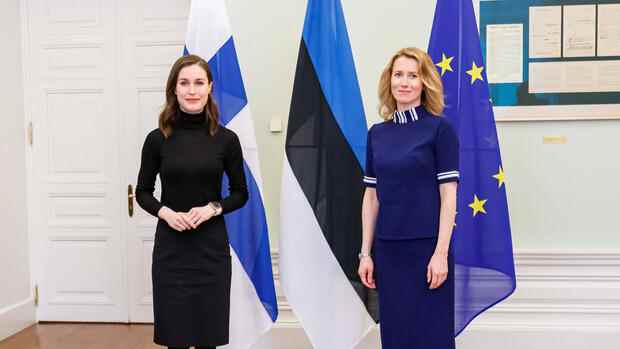Both prime ministers are calling for a tougher approach to Moscow.
(Photo: IMAGO/Scanpix)
Stockholm “Visiting Europe is a privilege, not a human right,” Estonian Prime Minister Kaja Kallas recently tweeted, calling on her EU counterparts to stop issuing tourist visas to Russian citizens. The reason for this is the Russian war of aggression in Ukraine. That was a few days ago. Since then, a discussion about a travel ban for Russian tourists to the EU has started in many countries. The Ukrainian President Volodymyr Zelenskiy recently called for an entry ban for Russian citizens into the EU.
Estonia, which is one of the biggest supporters of Ukraine in its fight against the Russian invading troops, will significantly tighten its visa regulations for Russian citizens from next Thursday. Only Russians who have their permanent residence in the Baltic country are allowed to enter the country. Russians who have close relatives in Estonia and Russian citizens who have a visa from another EU country are also exempt from the ban. Russian students studying in Estonia who are about to graduate are also allowed to enter.
In a television interview, Estonia’s Foreign Minister Urmas Reinsalu denied that the new regulation would introduce collective punishment for all Russians. “The war was started by the Russian Federation. There is no doubt that Russian citizens bear a moral responsibility for this war through their passivity,” he said, emphasizing once again that Russian citizens are not welcome in his country.
Significantly more Russian tourists who have a Schengen visa have been coming through the border crossing in the Estonian city of Narva for weeks. The vast majority of them have the airport in the capital Tallinn as their destination. From there it goes to other EU countries. Popular destinations are the Mediterranean countries of France, Greece, Italy and Spain.
Top jobs of the day
Find the best jobs now and
be notified by email.
While Chancellor Olof Scholz has been critical of a possible EU entry ban for Russians, the Estonian head of government is receiving support from her Finnish counterpart Sanna Marin. “It is not right that Russian citizens can live and move normally when at the same time Russia is waging a brutal war of aggression in Europe,” she said. Nevertheless, this question must be discussed with the other Schengen countries. The EU foreign ministers will have an opportunity to do so at their informal meeting in Prague at the end of August.
Countries are bound by Schengen rules
A majority of Finns are in favor of a general entry ban for Russian tourists. Especially since research by the public radio and TV broadcaster YLE revealed that the Messenger app Telegram currently offers car and bus tours to the Finnish airports in Lappeenranta and Helsinki. From there they fly on to their Mediterranean vacation. This has led to a big discussion in Finland. “They sunbathe on the beach while schools and hospitals are being leveled in Ukraine,” said one Finn on social media.
However, politicians are still struggling with a clear positioning. Because the question is complicated. Anyone traveling to Finland or Estonia with a visa issued by another Schengen country cannot be turned away under Schengen rules. There are also visas for multiple entries into the Schengen area. Anyone who has such a time-limited multiple-entry visa cannot simply be turned back at the border. In Finland alone, the customs authorities expect around 100,000 multiple-entry visas to be issued, and in Estonia there are said to be around 50,000.
The Finnish Foreign Minister Pekka Haavisto therefore also wants to raise the issue at the informal meeting in Prague. Visa-related decisions must comply with both Schengen and Finnish legislation, he stressed. So far, Finland, which shares a 1,300-kilometer border with Russia, can only delay issuing tourist visas. That would be tantamount to an “entry ban light”, as a Finnish MP put it.
Other countries such as Denmark, Belgium, the Netherlands, Slovakia, the Czech Republic and Malta are no longer issuing short-term visas for Russians. Sweden has not made a decision yet. Immigration Minister Anders Ygeman prefers a joint EU decision and wants to wait until then. Like Estonia and Lithuania, Latvia has stopped issuing new visas. Exceptions are only made for humanitarian reasons or if the applicant in Russia has to fear for his own safety. However, Latvia then requires those affected to sign a declaration expressly condemning the war in Ukraine.
Observers doubt that agreement will be reached in Prague on a common EU line. Especially since critics of a visa ban fear that it would only play into Russian President Putin’s hands. He could then once again present the West to his own people as his country’s greatest enemy.
More: Zaporizhia’s kilns are becoming a security risk
